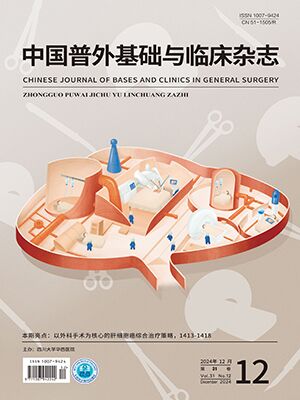| 1. |
凌露, 王京, 吴静, 等. 结直肠癌发生的相关危险因素分析. 中国病案, 2021, 22(8): 104-108.
|
| 2. |
Heidarnia MA, Monfared ED, Akbari ME, et al. Social determinants of health and 5-year survival of colorectal cancer. Asian Pac J Cancer Prev, 2013, 14(9): 5111-5116.
|
| 3. |
汪晓东, 李立. 数据库建设第一部分: 个人数据的标签与结构化. 中国普外基础与临床杂志, 2019, 26(3): 335-342.
|
| 4. |
汪晓东, 刘健博, 李立. 数据库建设第五部分: 结直肠癌的肿瘤特征—模块的设计(二). 中国普外基础与临床杂志, 2020, 27(4): 483-488.
|
| 5. |
汪晓东, 刘健博, 李立. 数据库建设第六部分: 结直肠癌分期的标签与结构化. 中国普外基础与临床杂志, 2020, 27(7): 873-879.
|
| 6. |
汪晓东, 朱佳怡, 李立. 数据库建设第十一部分: 结直肠癌随访的标签与结构化. 中国普外基础与临床杂志, 2021, 28(10): 1353-1359.
|
| 7. |
张元. 我国现代职业分类. 教育与职业, 2000, (1): 44, 45.
|
| 8. |
孙兢新. 第三次全国人口普查中的职业分类问题. 统计, 1982(2): 21-22.
|
| 9. |
Rasouli MA, Moradi G, Roshani D, et al. Prognostic factors and survival of colorectal cancer in Kurdistan province, Iran: a population-based study (2009–2014). Medicine (Baltimore), 2017, 96(6): e5941. doi: 10.1097/MD.0000000000005941.
|
| 10. |
Dasgupta P, Youlden DR, Baade PD. An analysis of competing mortality risks among colorectal cancer survivors in Queensland, 1996–2009. Cancer Causes Control, 2013, 24(5): 897-909.
|
| 11. |
Eloranta S, Lambert PC, Cavalli-Bjorkman N, et al. Does socioeconomic status influence the prospect of cure from colon cancer—a population-based study in Sweden 1965–2000. Eur J Cancer, 2010, 46(16): 2965-2972.
|
| 12. |
Kato I, Tominaga S, Ikari A. The role of socioeconomic factors in the survival of patients with gastrointestinal cancers. Jpn J Clin Oncol, 1992, 22(4): 270-277.
|
| 13. |
Reynolds R, Little MP, Day S, et al. Cancer incidence and mortality in the USA Astronaut Corps, 1959–2017. Occup Environ Med, 2021, 78(12): 869-875.
|
| 14. |
Mahmood S, English DR, MacInnis RJ, et al. Domain-specific physical activity and the risk of colorectal cancer: results from the Melbourne Collaborative Cohort Study. BMC Cancer, 2018, 18(1): 1063. doi: 10.1186/s12885-018-4961-x.
|
| 15. |
Colditz GA, Cannuscio CC, Frazier AL. Physical activity and reduced risk of colon cancer: implications for prevention. Cancer Causes Control, 1997, 8(4): 649-667.
|
| 16. |
梁童心, 齐亚强, 叶华. 职业是如何影响健康的?—基于2012年中国劳动力动态调查的实证研究. 社会学研究, 2019, 34(4): 193-217, 246.
|
| 17. |
王晓娟. 职业差异对劳动者健康的影响—基于中国劳动力动态调查(2018)的实证分析. 三峡大学学报(人文社会科学版), 2022, 44(5): 50-55.
|
| 18. |
Harriss DJ, Cable NT, George K, et al. Physical activity before and after diagnosis of colorectal cancer: disease risk, clinical outcomes, response pathways and biomarkers. Sports Med, 2007, 37(11): 947-960.
|
| 19. |
Kang SK, Burnett CA, Freund E, et al. Gastrointestinal cancer mortality of workers in occupations with high asbestos exposures. Am J Ind Med, 1997, 31(6): 713-718.
|
| 20. |
Germani D, Belli S, Bruno C, et al. Cohort mortality study of women compensated for asbestosis in Italy. Am J Ind Med, 1999, 36(1): 129-134.
|
| 21. |
Berry G, Newhouse ML, Wagner JC. Mortality from all cancers of asbestos factory workers in east London 1933-80. Occup Environ Med, 2000, 57(11): 782-785.
|
| 22. |
Alexander DD, Weed DL, Mink PJ, et al. A weight-of-evidence review of colorectal cancer in pesticide applicators: the agricultural health study and other epidemiologic studies. Int Arch Occup Environ Health, 2012, 85(7): 715-745.
|
| 23. |
Lin S, Wang X, Yano E, et al. Exposure to chrysotile mining dust and digestive cancer mortality in a Chinese miner/miller cohort. Occup Environ Med, 2014, 71(5): 323-328.
|
| 24. |
Cohen SS, Sadoff MM, Jiang X, et al. A review and meta-analysis of cancer risks in relation to Portland cement exposure. Occup Environ Med, 2014, 71(11): 796-802.
|
| 25. |
Gerosa A, Scarnato C, Marchesini B, et al. Mortality study in a cohort of workers employed in the hot working processing of plastics and rubber. Epidemiol Prev, 2017, 41(2): 125-133.
|
| 26. |
Desoubeaux N, Herbert C, Launoy G, et al. Social environment and prognosis of colorectal cancer patients: a French population-based study. Int J Cancer, 1997, 73(3): 317-322.
|
| 27. |
Baade PD, Turrell G, Aitken JF. A multilevel study of the determinants of area-level inequalities in colorectal cancer survival. BMC Cancer, 2010, 10: 24. doi: 10.1186/1471-2407-10-24.
|
| 28. |
Schneider NI, Langner C. Prognostic stratification of colorectal cancer patients: current perspectives. Cancer Manag Res, 2014, 6: 291-300.
|
| 29. |
Chen K, Collins G, Wang H, et al. Pathological features and prognostication in colorectal cancer. Curr Oncol, 2021, 28(6): 5356-5383.
|




